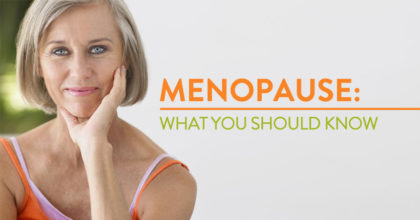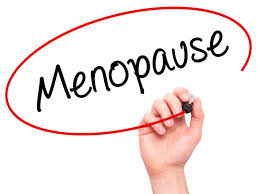Table of Contents
Menopause – Symptoms and Treatments
 Menopause – just the mention of the word is enough to give many women the chills – or more aptly – hot flashes. Many women dread even thinking ahead to “The Change”, as they have heard many negative comments from other women who have already gone through this life-changing period.
Menopause – just the mention of the word is enough to give many women the chills – or more aptly – hot flashes. Many women dread even thinking ahead to “The Change”, as they have heard many negative comments from other women who have already gone through this life-changing period.
I would like to help women see menopause in a new light – and realize that menopause symptoms can be reduced and often times eliminated. Menopause is an inevitable part of aging – but it doesn’t have to be a negative change.
What is Menopause?
Menopause is the time that marks the end of your menstrual cycles. It’s diagnosed after you’ve gone 12 months without a menstrual period. Menopause can happen in your 40s or 50s, but the average age is 51 in the United States.
Menopause is a natural biological process. But the physical symptoms, such as hot flashes, and emotional symptoms of menopause may disrupt your sleep, lower your energy or affect emotional health. There are many effective treatments available – including things like herbal supplements, lifestyle adjustments to hormone therapy.
Menopause Symptoms
 In the months or years leading up to menopause (perimenopause), you might experience these signs and symptoms of menopause:
In the months or years leading up to menopause (perimenopause), you might experience these signs and symptoms of menopause:
-
- Irregular periods
- Vaginal dryness
- Hot flashes
- Chills
- Night sweats
- Sleep problems
- Mood changes
- Weight gain and slowed metabolism
- Thinning hair and dry skin
- Loss of breast fullness
Symptoms, including changes in menstruation, are different for every woman. Most likely, you’ll experience some irregularity in your periods before they end.
Skipping periods during perimenopause is common and expected. Often, menstrual periods will skip a month and return, or skip several months and then start monthly cycles again for a few months. Periods also tend to happen on shorter cycles, so they are closer together. Despite irregular periods, pregnancy is possible. If you’ve skipped a period but aren’t sure you’ve started the menopausal transition, consider a pregnancy test.
What can I do to make menopause better?
There are many things you can do to help treat menopause symptoms and make the ordeal much easier to take. I break these down to 3 main categories:
- Herbal Remedies
- Nutrition
- Lifestyle
“What will work best for me?” That depends on the individual, and to some degree, trial and error may be necessary to see what works best for you. Most of these menopause ‘solutions’ will have a positive effect on your overall health, so even if they don’t “fix” your menopause issues – they are still worth implementing. Here is a more in-depth look at what I consider the 3 main treatments for menopause symptoms.
Herbal Remedies
Herbal remedies are an excellent choice for helping reduce menopause symptoms – and many can also help another side effect of menopause – a reduced sex drive. Many herbs have a positive effect on treating menopause – and here are some to consider:
1. Try taking some black cohosh
This is an extremely popular herbal remedy for menopausal symptoms, including hot flushes. Thousands of women swear by it, while some studies have found it has a positive effect on hot flushes. Black cohosh is not recommended if you have a history of liver problems.
2. Opt for some red clover
Another very popular herbal remedy, red clover contains isoflavones, plant chemicals, which have an oestrogen-like effect on the body. Controlled trials have found red clover has a modest effect on relieving menopausal symptoms, however it’s not suitable if you have a history of breast cancer or other hormone-related cancers.
3. Eat more sage
Not just useful for flavouring roast chicken, sage can also help reduce the excess sweating and hot flushes associated with menopause. Traditionally, it has also been used to treat poor memory, another common menopause symptom. Use a tincture or add some sage leaves to hot water to make a tea.
4. Reduce anxiety with St John’s Wort
If your menopause symptoms include feeling low or anxious, St John’s Wort may help. It is a traditional herbal medicine used to relieve the symptoms of slightly lower moods and mild anxiety. It’s thought that St John’s Wort helps boost levels of serotonin, the ‘feel-good’ chemical in the brain.
Nutrition
Many dietary or nutrition changes can have a positive effect on treating menopause. Nutritional changes can also improve several other aspects of your overall health including cardiac and respiratory health.
1. Consume food filled with phytoestrogens
Phytoestrogens are plant oestrogens believed to have oestrogen-like effects on the body. You can find them in soy foods, lentils, chickpeas and kidney beans. Add some flaxseeds, chicory, endive and celery to your diet, too, as they contain a fibre called lignin which is a major phytoestrogen.
2. Incorporate liver-supporting foods into your diet
Oestrogen is redistributed by the liver so eat plenty of spring onions, artichokes, asparagus and fennel, which have been shown to help support liver function. Coffee, spicy foods and alcohol can affect your liver and make hot flushes worse, so try to avoid them during the perimenopause.
3. Eat plenty of fish oils
Fish oils are rich in omega-3 essential fatty acids which are important for lubricating the whole body. They can help tackle joint pains, dry skin and vaginal dryness associated with the menopause. You can find EFAs in oily fish such as salmon and mackerel, in linseeds, and smaller amounts in nuts and seeds.
Lifestyle Changes
There are some lifestyle changes you could consider which can have a large impact on menopause and how it affects you. This includes things like exercise, meditation, and even things like acupuncture.
1. Keep fit by staying active
Weight bearing exercises can improve bone density and help protect against osteoporosis, while moderate aerobic exercise like brisk walking or tennis can tackle hot flushes. A study published in Menopause International found moderate exercise could keep hot flushes at bay for up to 24 hours after a workout.
2. Practice mediation and yoga
Great to practice no matter what your age, a recent study published in Menopause International also found that yoga was beneficial in relieving menopause symptoms while meditation could also be beneficial. Experts are now calling for more research into these ‘drug-free’ treatments to help relieve symptoms of menopause.
3. Try out acupuncture
Acupuncture has previously been shown to have some benefits in tackling menopause symptoms, while a recent study published in the British Medical Journal also found it had some reduction on the severity of flushes however more research is needed.
Menopause – A New Beginning
 While many women look at menopause as the end of an era in their life – I believe women should embrace this change of life and view menopause through the lens of “A New Beginning”. While menopause does signal the end of a woman’s child-bearing years, it also signals the beginning of a new chapter of life that can be extremely enjoyable and rewarding.
While many women look at menopause as the end of an era in their life – I believe women should embrace this change of life and view menopause through the lens of “A New Beginning”. While menopause does signal the end of a woman’s child-bearing years, it also signals the beginning of a new chapter of life that can be extremely enjoyable and rewarding.
For most women, if you are entering the ‘menopause era’ of your life, this probably signals a time when your children are older (and possibly on their own) – and you may have new time on your hands to consider things like travel, a career change, or a new commitment to your own health and happiness.
In any case, I just want women to know that menopause does NOT have to be a negative chapter in your life, and can in fact signify the start of an exciting NEW chapter in the exciting novel that is your life. Not only can you control the physical symptoms of menopause – you can also control the emotional aspects of menopause and how it affects you. This can be the beginning of an amazing new part of your life – and you should fully embrace it!